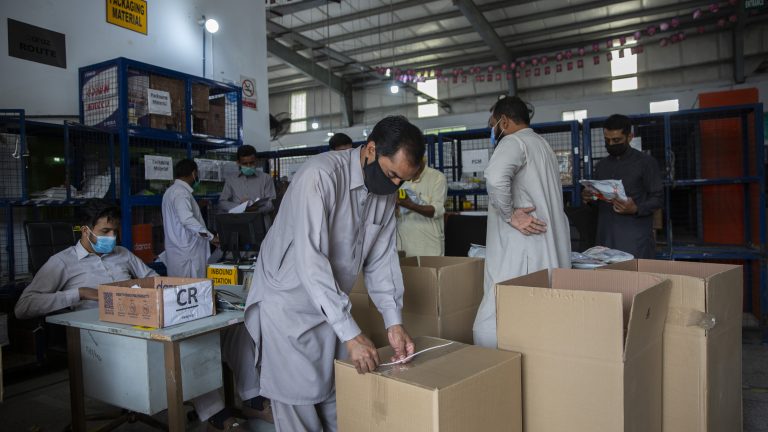In May 2021, Amazon fulfilled a long-standing demand of Pakistani businesses by allowing sellers from the country to list their products on its platform. The decision set off a frenzy. “People have gone crazy about selling on Amazon,” Islamabad-based seller Tahir Farooq, who sold goods worth $45 million on Amazon in 2022, told Rest of World. “Pakistanis were actually desperate. They were waiting for this opportunity.”
Within a year of its official launch, Pakistan became the country with the third-highest number of sellers registered on Amazon, behind only the U.S. and China, according to e-commerce intelligence firm Marketplace Pulse.
But sellers say this boom also created a robust scamming industry where some of them have found innovative ways to dupe customers. These scams have started impacting Amazon sellers across the country. Four Pakistani Amazon sellers told Rest of World that they face rigorous vetting, long delays, and difficulty in opening new accounts on the e-commerce platform, which they attribute to scammers.
“Pakistani IPs are blacklisted,” Ayaz Ali, a Lahore-based seller clocking revenues reaching £60,000 via Amazon through last fall, told Rest of World. “You can create an account, and instantly, it’s blocked or sometimes never approved.” Sellers like Ayaz Ali are worried that the scams could prompt Amazon to discontinue its services in Pakistan altogether. Amazon did not respond to queries sent by Rest of World.
In May 2022, Amazon shut down roughly 13,000 Pakistani seller accounts that it suspected of fraud. Most of these blocked accounts originated from two cities in Punjab: Mian Channu and Sahiwal. Amazon even blacklisted IP addresses in Mian Channu.
Amazon sellers from Mian Channu congregate on Facebook groups of 2,000 to 13,000 members, and hash out ways to execute drop-shipping scams: Unsuspecting customers are sent fake tracking details, while sellers siphon off money from Amazon accounts. It’s called the kabootar scam, named after the Urdu word for pigeon.
The kabootar trick is the most popular Amazon sellers’ scam in Pakistan. The way it works, Farooq explained, is that sellers create fake tracking numbers, against which Amazon releases the payment, under the impression that the product has been dispatched. By the time a customer files a complaint of non-delivery, it’s too late for Amazon to take any action.
Other tricks, such as fake refunds, tax fraud, and scams with unique monikers like “carding” — the use of stolen credit card numbers to purchase gift cards to resell on Amazon — have also been afloat. Such discussions on scams happen alongside honest sellers looking to make bank through drop-shipping.
“If you can’t give anything to Pakistan, at least don’t cause harm.”
According to local media reports, most of these scams originate from Mian Channu and Sahiwal. Residents have been unhappy about these areas getting a scammy reputation. “Amazon will no longer trust [us],” commented a Mian Channu resident on a Facebook post requesting assistance with a kabootar payment from a buyer in Canada. “If you can’t give anything to Pakistan, at least don’t cause harm [to the country],” said a post on the Amazon Dropshipping Mian Channu Facebook group. “You won’t let any market survive,” wrote another resident, beneath the same post.
Rest of World found over a dozen e-commerce Facebook groups related to drop-shipping in Mian Channu, and several posts on these groups echoed a similar sentiment.
Facebook groups are immensely popular in Pakistan, often functioning as self-help collectives for aspiring entrepreneurs. Before Amazon added Pakistan to its seller registry, local business owners congregated on groups such as Amazon Mastermind – Pakistan, and discussed ways to export their products, posting queries and concerns.
Stories about Amazon sellers making millions have attracted aspiring sellers to seek out courses and mentors to learn the tricks of the trade. Youngsters in second-tier Pakistani cities aspire to be Amazon sellers, according to market watchers. Amazon sellers are regarded as hotshots, and desirable candidates for arranged marriages.
Farooq said this gold rush is being leveraged by a growing crop of “training institutes” that advertise paid courses teaching people to become Amazon sellers.
Facebook groups, such as eCommerce by Enablers and Extreme Commerce by Sunny Ali, which offer legitimate, paid training sessions, e-commerce bootcamps, and assistance with product research, are buzzing with activity. Often, these groups are led by eclectic leaders: self-described “lifestyle coaches” with a massive fan base. “Definitely after 2021, this trend [of training] has increased,” Farooq said. “I think now, in every city of Pakistan, there is a training company which is providing training to sell at Amazon.”
But many of these training groups, too, are sometimes breeding grounds for future scammers.
Shayan Ali, an alleged kabootar scammer from Mian Channu, told Rest of World that he himself had once been scammed in the process of orchestrating a scam. In November 2022, he hired a virtual assistant to operate one of his Amazon accounts. “I paid him 50,000 Pakistani rupees [$221], he said he would help me with creating fake tracking IDs, and then he disappeared,” Shayan Ali said. He was livid, and posted his scammer’s name and location all over an Amazon drop-shipping Facebook group, with cautionary comments.
One user pointed out the irony of what had happened. “Now that you aren’t able to orchestrate drop-shipping scams, you are being scammed yourself,” the person wrote. “Shame on the people of Pakistan who are now scamming each other.”
“Shame on the people of Pakistan who are now scamming each other.”
Ayaz Ali, the founder of Lahore-based e-commerce agency Inoventive Global, who also runs a YouTube channel educating Pakistanis on how to get started on Amazon, told Rest of World about another popular Amazon scam, which has since been reined in, involving Sam’s Club credit memberships. The American retail chain offers credit memberships to U.S.-based users. Pakistani sellers would register a U.S. company and apply for a credit limit on Sam’s Club, which, in some instances, will allow a credit limit of up to $10,000 to shop.
Amazon scam sellers would receive orders from customers on the Amazon marketplace. Then, the scamster would use the credit card limit on the secondary Sam’s Club account to purchase and deliver the order to the customer. This allows scammers to receive payment from the customer, and claim a refund from Sam’s Club. “This is called fake refunds,” Ayaz Ali said. He estimates that at their peak, about three months ago, the kabootar trick and fake returns accounted for the majority of the scams.
As Amazon continues its crackdown, a number of scammers have redirected their energies toward Walmart drop-shipping, Ayaz Ali said. “They have changed the names of their pages and groups from Amazon drop-shipping to Walmart drop-shipping,” he said. “I will be making a video on this as well.”



